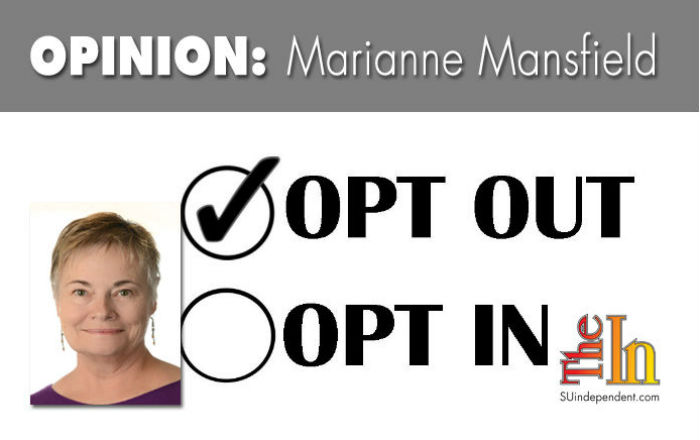
Written by Marianne Mansfield
While evidence is ever- building that ours is becoming an Opt-Out Society, the state of Utah on Wednesday, March 4, 2015 proved that there is better way to do business. With the introduction of SB 296, the Anti-Discrimination and Religious Freedom Amendments, majority church leaders, state legislative leaders, members of the LGBT community and Equality Utah proclaimed that compromise is possible when those at the table are as committed to respecting the beliefs and biases of others as they are to their own.
As of the prior Tuesday evening, I was going to write this column about the Opt-Out Society. I’ll admit, it was going to be a ‘Woe is Us’ kind of piece. I wondered then what the prolific number of opt out choices meant for the moral sensibility of this country. Was it a harbinger that compromise was, if not dead, then at least on life support? Were we doomed to become a place where your rights end where mine begin? And, despite what has happened on Wednesday, in Utah I still do wonder. For example:
Parents can opt out of having their children vaccinated – 48 states allow religious exemptions for religious reasons – 20 states for philosophical reasons.
Citizens of St. George may well be given the choice of opting out of a mandatory recycling program in our community.
Parents in all states can opt their children out of taking Common Core aligned tests. The website http://optoutofstandardizedtests.wikispaces.com/ offers opt-out information for all 50 states and the District of Columbia. In fact, parents can opt their children out of public school altogether, choosing instead to home school them.
Physicians can opt out of providing health care to Veterans caught in the slow moving Veterans’ Administration medical system because the VA reimbursement to those docs is less than the minimum Medicare standard payment.
In Michigan, a bill was proposed to allow EMTs to opt out of providing care to people identified as members of the LGBT community.
I wondered about the history of the opt-out movement, and attempted to trace it backwards from the present time. Not surprisingly, following the track backward is convoluted at best. One often ends up at sites instructing their readers on how to opt-out of unwanted advertising, those annoying pop-ups that appear on cell phones, tablet,s and computers. Another track lands you in the world of research and popular articles about, and by, career women who choose to ‘opt-out’ to raise their families. Interesting, isn’t it?
The opportunity to opt out of a law or a regulation smacks of individual opportunism, to me. The good of the collective be damned.
Vaccination regulations are imposed for the health of the majority, especially those children who are thrown together in crowded classrooms across our country. To date, there is no conclusive evidence that links specific vaccination strains to childhood maladies.
Recycling not only supports the health and prosperity of our beautiful surroundings, it is also the right thing to do, given that we humans made the mess in the first place. Nothing short of a society’s joint efforts will safeguard communities from succumbing to the encroachment of landfills filled with trash that could have been reused somehow.
And, as a former educator, I get that the standardized tests designed to measure progress on the Common Core aren’t perfect. I used to join in with the legions of other educators to bemoan the time they took away from meaningful classroom instruction. But until they changed the law, they were the law and were what we were expected to do. Since part of our state and federal funds depended on showing continual progress on the tests, the opt-out provisions carried additional weighty significance. If our best and brightest students had parents who opted them out, our financial well-being was jeopardized.
And how fair is it that Veterans who became ill defending our country and who cannot get the care they need within the VA system, are prevented from getting care from doctors who have decided that the dollar is greater than a demonstrable commitment to human compassion?
And the bill in Michigan to allow health care providers to opt-out of treating members of the LGBT community? Is that anything more that a horrific example of homophobia?
I continue to fear that opting out will become the off-ramp for how we get around gnarly disagreements of philosophy or belief.
But Utah has demonstrated that the road doesn’t end just because an off-ramp exists.
I don’t know the particulars of the SB 296, but I watched the press conference. I saw the look of startled amazement in the eyes of those who spoke. They’d done it. A bill that originally contained an opt-out provision had emerged, through the yeoman’s work of a mashed-up group of caring people, as an example of the beauty of compromise.
Is it a perfect bill? Of course it isn’t. No one on the dais claimed as much. But the pride each took in the efforts they’d made tells me it is a very good and very honorable piece of work.
Aung San Suu Kyi, a Burmese opposition politician and human rights activist said this about the art of compromise. “If you want to bring an end to long-standing conflict, you have to be prepared to compromise.”
This week, the state of Utah demonstrated a profound understanding of Kyi’s words.
Marianne Mansfield has lived in Southern Utah since 2010. She and her husband followed their grandchildren to this area from Michigan. In her former life she was a public school educator. More than half of her career was spent as an elementary principal, which is why her response to most challenges is, “This isn’t my first rodeo.” She grew up in Indiana, and attended Miami of Ohio, Ball State University and Michigan State. She is a loyal MSU Spartan and Detroit Tiger baseball fan. She has been writing fiction and opinion since her retirement in 2004.




